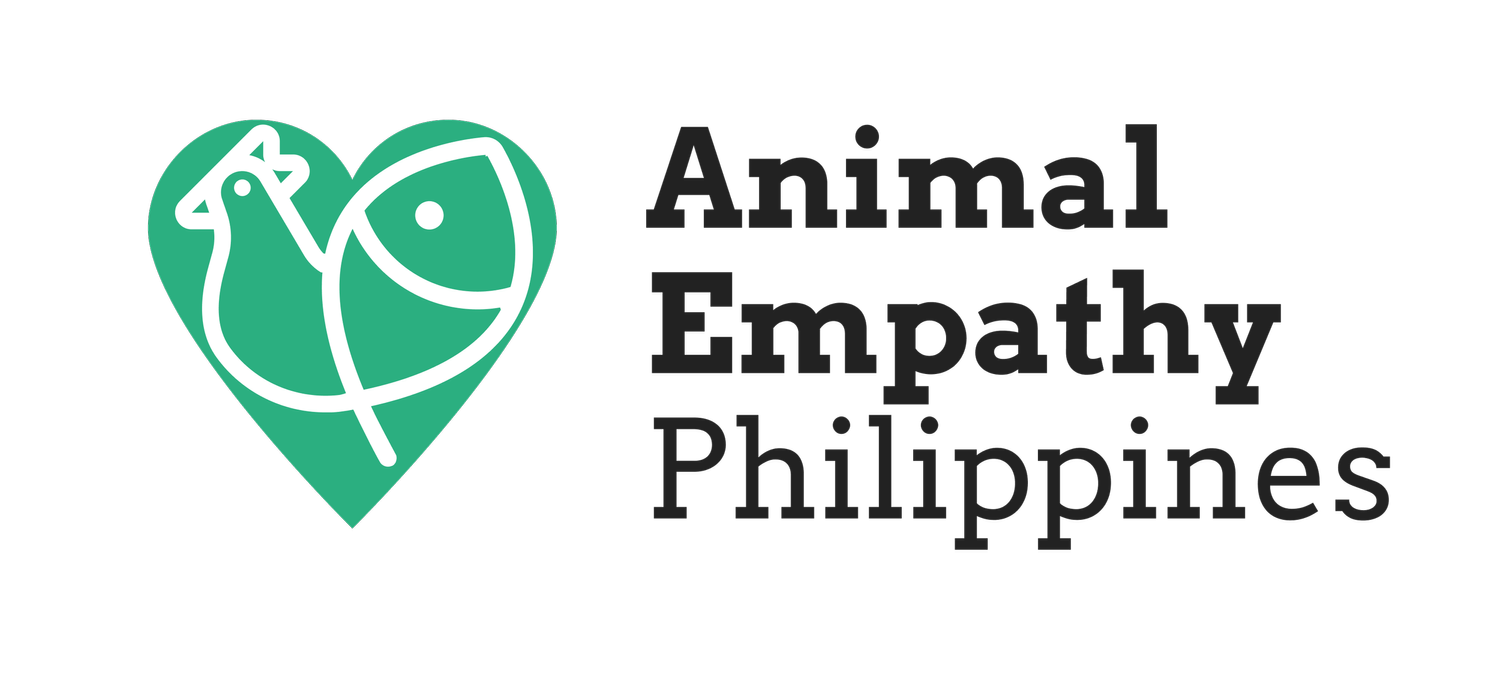Farmed animal advocacy movement in the Philippines: What are we doing and where are we heading?
by Julia Dolfo de Castro
The Various Roles of Filipino Farmed Animal Advocates
Recently, the Philippines was reported to be one of the countries that are least cruel to farmed animals. This can be surprising as meat is deeply part of many Filipino food.
Nonetheless, in the Philippines, an increasing number of individuals and organizations are actively engaged in advocating for the welfare of farmed animals. These advocates play various roles in different areas, contributing to the overall mission of improving the lives of farmed animals and our perception of them. Below are some of the key roles played by Filipino farmed animal advocates.
1. Direct Care
There are dedicated individuals and organizations that provide sanctuary and care not only for companion animals but also for farmed animals. Organizations like the Philippine Animal Welfare Society (PAWS), Animal Kingdom Foundation (AKF), Happy Animals Club, Philippine Animal Rescue Team (PART), and Best Friends Furever Sanctuary, Inc. work tirelessly to provide a safe haven for rescued farmed animals.
Some of these organizations are also involved in disaster relief operations, rescuing both companion and farmed animals in times of natural calamities.
2. Lobbying and Campaigns
Many organizations that are into direct care also work tirelessly to lobby causes for farmed animals. For one, PAWS has lobbied for improving the welfare of animals in farms and slaughterhouses. In 2020, PAWS launched The Better Chicken Option (TBCO) campaign to urge farmers, through webinars and roundtable discussions, to commit to higher welfare standards in raising broiler chickens. In 2021, they commissioned a study that revealed that Filipinos care about chickens next to dogs and cats. Because of this information, PAWS was able to make restaurants and food businesses like Figaro, Tien Ma’s, Angel’s Pizza, and Binalot sign up to be TBCO partners.
3. Research
There are researchers in the Philippines who are actively working on alternative proteins and farmed animal advocacy. Notably, Animal Empathy Philippines (AEP) has initiated a scoping report on alternative proteins. AEP recently concluded its journey mapping research on Filipino farmed animal advocates.
Meanwhile, AKF has conducted a study to better understand the state of fish welfare in the Philippines, specifically farmers’ and stakeholders' perception toward fish welfare and their awareness of relevant welfare regulations, standards, and laws. From their findings, they were able to provide recommendations on how to capacitate stakeholders in improving fish welfare in the Philippines.
These efforts are crucial in providing data that will inform farmed animal advocacy in the country.
4. Education
Several community groups formed in social media conduct workshops, fellowships, and discussions to raise awareness about farmed animal advocacy. Manila Vegans, a Facebook community group, not only provides space and resources for individuals who want to keep farmed animals off their plates; they also organize educational webinars and discussions to help individuals become better farmed animal advocates.
AEP has also been conducting fellowships and workshops to capacitate and empower farmed animal advocates in their advocacy efforts.
5. Community Engagement
Creating a sense of community is crucial in any advocacy movement. There are several groups that organize get-togethers and social activities to foster a safe and friendly environment for advocates and allies. Some Facebook community groups like Manila Vegans and Vegan Brunch Club PH hold potlucks where animal advocates can socialize.
The Good Food Company fosters relationships between farmers and consumers through partnerships and community gatherings such as Good Food Sundays. Vegans of Manila collaborate with vegan food innovators and animal protection organizations to organize events like the annual VegFest Pilipinas and bring together advocates and allies.
These gatherings allow like-minded individuals to connect, network, exchange ideas, and support one another in their advocacy efforts.
6. Alternative Solutions
Some advocates provide practical solutions by creating alternatives to animal products. They work on developing plant-based alternatives to meat and vegan versions of traditional Filipino foods. By offering viable and delicious alternatives, advocates like chef RG Enriquez-Diez (widely known as Astig Vegan) contribute to reducing the demand for animal products and promoting a more compassionate lifestyle.
WTH Foods is just one of the many companies venturing into food innovation, creating plant-based alternative meats from soy, wheat, and microalgae.
7. Communications
Communication plays a vital role in raising awareness about farmed animal welfare. Many Filipino farmed animal advocates utilize social media platforms and create artistic expressions to spread their message of compassion. Through engaging content and personal stories, they showcase how their lifestyles align with their values, encouraging others to consider the ethical implications of their dietary choices.
8. Healthcare and Fitness Practice
There are farmed animal advocates who emphasize the benefits of veganism or a plant-based lifestyle to health and fitness. Plant-based nutritionist-dietitian Roni Matalog is on a mission to help Filipino vegans, vegetarians, or anyone who's interested in shifting to a plant-based lifestyle achieve their optimal health through a plant-based diet that is adequate, balanced, and sustainable. Her goal is to provide her clients the tools, resources, support, accountability, and guidance to eat more whole plant foods and live a joyful and fulfilling plant-based life.
The documentary The Game Changers has inspired many health-conscious individuals and athletes to go plant-based. It debunks the myth that we need to kill animals to acquire protein. As Filipina fitness coaches Sam Bumagat and Air Hernaez prove, it is possible to be strong and fit on a vegan diet.
9. Movement Building
There are non-governmental organizations (NGOs) and start-ups dedicated to farmed animal advocacy that seek funding or grants to support their initiatives and help grow the farmed animal movement. These organizations play a critical role in bringing together advocates and capacitating them, coordinating efforts and interventions, and implementing impactful projects that drive change at a larger scale.
Who Else Are Working in the Space?
In a deep dive session held by the AEP core team in January, it was discussed that there are more active efforts and interventions being done by farmed animal advocates in the Philippines although they may not be explicit. As Enzo Bautista says, animal advocacy is a spectrum. Thus, we have to recognize that farmed animal advocates are on different levels in terms of awareness and efforts.
Thus, Indigenous Peoples can be considered advocates too. They, after all, have a different view of animals and Nature, one that is not extractivist and which we must be receptive to if we are to commit to changing our relation with farmed animals.
People in tech, as pointed out by Castle Reynera, also help farmed animal advocacy by analyzing data and developing technological tools that can help improve the lives of farmed animals.
Some healers and meditation practitioners, as mentioned by Janaisa Baril, help us see the world holistically and advocate for respecting nonhuman animals with whom we share the world.
Definitely, Filipino farmed animal advocates contribute to the betterment of our perception and treatment of farmed animals in various roles and areas. Collectively, these endeavors certainly work towards creating a more compassionate and sustainable future for farmed animals in the Philippines.
Where Are We Going?
During the core team’s first deep dive session discussing where farmed animal advocacy in the Philippines is heading given the above-mentioned efforts and our available resources, it was pointed out that some promising opportunities in the movement would be maximizing support in existing communities through partnerships, empowering the youth through capacity building, connecting with other advocacies, leveraging on multimedia and new media for more visibility, and prioritizing available opportunities.
While we have a general picture of the active efforts being done by advocates, we do not exactly have data on how much impact or change these efforts are making for farmed animals in the country. Nonetheless, mapping the journey of Filipinos to farmed animal advocacy is already a step forward in supporting and expanding the growing movement in the Philippines.

